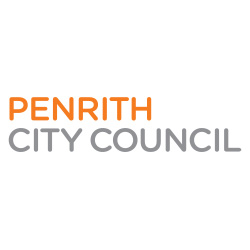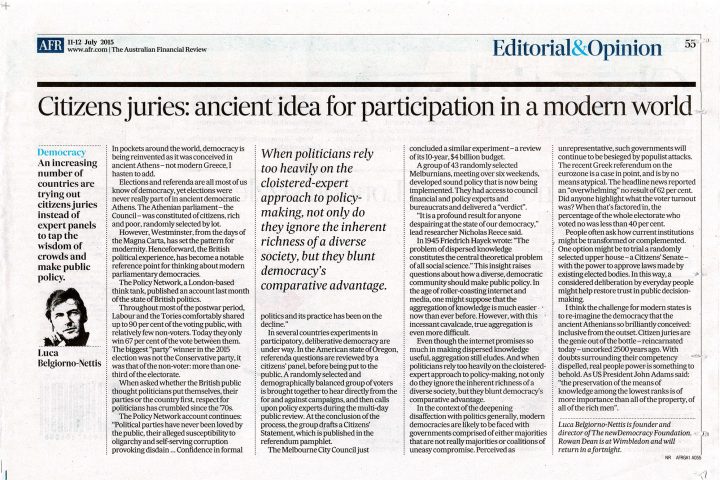As published on SMH on 25 August 2015 It has long been an axiom of government that the key to success is trust. As long ago as Confucius it was held that three things were needed for government – weapons, food and trust – but that if a ruler could not hang on to all three, they must guard trust to the...Continue reading
Penrith City Community Panel (2015)
Balancing competing needs in a growing community Penrith City Council is a large, iconic council area and like many local government authorities in New South Wales, it is growing and changing rapidly. That change brings with it both opportunities and pressures on services and finite resources. With nearly $300m of future infrastructure needs already identified...Continue reading
RADIO NATIONAL | How to reinvigorate democracy
The parliamentary vote on same sex marriage is likely to be defeated, and the Prime Minister is advocating a range of options for what comes next. One is a national plebiscite on the issue at the next election. This would only be the third in Australia’s history.
THE AGE | New MPs want to restore faith in politics
By Michael Gordon, Political editor, The Age. What struck new MP Tim Watts most about question time when he took his seat in the Parliament after the last election was not the rancour, or the shallowness, or the pettiness or even the name-calling. It was the noise. So Watts downloaded a noise-meter on his iPad...Continue reading
Citizens’ juries could reduce Auckland’s democratic deficit
Nicholas Ross Smith & Zbigniew Dumienski A report by Bernard Orsman published in the New Zealand Herald on the state of Auckland City Council found that 88 of the 99 positions in the council’s boardrooms and executive teams were filled by “white men from wealthy suburbs.” While nobody is suggesting that any of these individuals...Continue reading
Citizens juries: ancient idea for participation in a modern world
In pockets around the world, democracy is being reinvented as it was conceived in ancient Athens – not modern Greece, I hasten to add! Elections and referenda are all most of us know of democracy, yet elections were never really part of ancient democratic Athens. The Athenian parliament – the Council – was constituted of...
Radio National. Shaping democracy for the people
Presented by Jonathan Green. Sunday 5 July 2015. Winston Churchill once said, “Democracy is the worst form of government, except for all the others”. 70 years on, with a world facing unprecedented challenges including climate change and growing inequality, could our democratic system use a bit of tweaking? In the UK last week, a major...
The Age. Experiment pays off: Melbourne People’s Panel produces quality policy
Nicholas ReeceCitizen juries are one of the most promising innovations to emerge in the conversation about democratic renewal. Melbourne’s radical experiment in democracy has reached a momentous conclusion, with the City Council announcing on Friday it will accept nearly all the recommendations of a 10-year financial plan developed by a citizens’ jury. That a group...Continue reading
RADIO NATIONAL | Citizen juries – leadership for a new democracy
How would you like to actively participate shaping government policies, not just indirectly through your vote? Citizen juries allow just that. State and local governments have started to use citizen juries to address issues like infrastructure, budgeting or reforming the electoral system. These participatory democracy projects could radically alter the way all tiers of Australian...Continue reading



